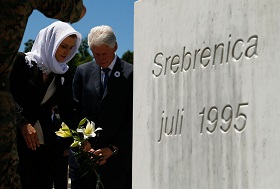On March 24, 2016, another leaf was formally turned in the story that unfolded in the Balkans in the 1990s: a sentence was passed on Radovan Karadžić, leader of Bosnian Serbs during the civil war in Bosnia and Herzegovina. The International Criminal Tribunal for the former Yugoslavia rendered its decision, which had been in the works for eight years, ever since Karadžić was arrested in 2008. The man who had served as President of the Republika Srpska from 1992 to 1996 was sentenced to a prison term of 40 years for war crimes and crimes against humanity.
On March 24, 2016, another leaf was formally turned in the story that unfolded in the Balkans in the 1990s: a sentence was passed on Radovan Karadžić, leader of Bosnian Serbs during the civil war in Bosnia and Herzegovina. The International Criminal Tribunal for the former Yugoslavia rendered its decision, which had been in the works for eight years, ever since Karadžić was arrested in 2008. The man who had served as President of the Republika Srpska from 1992 to 1996 was sentenced to a prison term of 40 years for war crimes and crimes against humanity.
The Tribunal itself was time and again accused of being politically prejudiced and biased, and there are many today who doubt that the verdict is just. I believe, however, that the issue is not whether the Hague Tribunal has rendered a just verdict (in a civil war, all parties involved are inevitably guilty). The issue is what political effect this verdict will have. The most controversial count of the indictment, which is being criticized by Serbs and Bosnian Muslims alike, is that of “genocide” against the Muslim population of the town of Srebrenica.
The exact number of victims is still unknown, the figures range from 800 to 8,500 being killed. Srebrenica has become the epitome of savagery in the Balkans and has long since been transformed from a case that should be investigated in a careful, objective and unbiased manner into an instrument of symbolic politics, which is used to morally justify one party and denigrate the other. That is why the charge of “genocide” in Srebrenica was intended to be an “example” for the international community. This charge acquires a very special tinge if one considers that in July 2015, after a vote in the UN Security Council, Russia vetoed a resolution proposed by the United Kingdom that would treat the killings of the Bosnian Muslim population in Srebrenica as “genocide”, condemning it as “confrontational”.
For Serbs, Karadžić is the epitome of a politician who defended his people during the bloody events in Bosnia and Herzegovina. Besides, Karadžić’s case fits in the series of past and current trials of Serbian politicians and generals who fought in the civil war in Bosnia and Herzegovina. There were virtually no such trials of Bosnian or Croatian participants, or they never gained much publicity. Taken together, these factors create the feelingthat Karadžić’s verdict was unjust and politicized.
Most likely, despite the fact that Karadžić has appealed, the guilty verdict will stand, and Karadžić himself will remain for Serbs “a fighter against the unjust system.” A situation when one party to a conflict is stigmatized is not conducive to final peace-making and reconciliation. On the contrary, such a situation will only broaden the chasm that separates Serbs and Muslims in Bosnia and Herzegovina today. Consequently, Karadžić’s sentence is, alas, the turning of a new leaf in a story that continues to influence the present.
Daria Basova, student, Moscow State Institute of International Relations under the Ministry for Foreign Affairs of the Russian Federation





